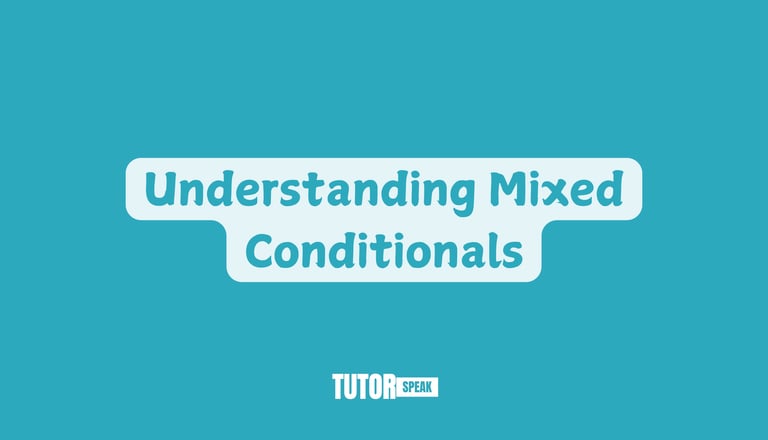Understanding Mixed Conditionals
Mixed conditionals combine two different time frames in the "if" clause and the main clause. These conditionals are used when the time of the condition and the time of the result are not the same. Mixed conditionals allow us to describe situations where past actions have present consequences or where present conditions could have changed the past.
TutorSpeak
12/9/20242 min read


Understanding Mixed Conditionals
Mixed conditionals combine two different time frames in the "if" clause and the main clause. These conditionals are used when the time of the condition and the time of the result are not the same. Mixed conditionals allow us to describe situations where past actions have present consequences or where present conditions could have changed the past.
Types of Mixed Conditionals
There are two common types of mixed conditionals:
1. Past Condition + Present Result
This type expresses how a past action (or inaction) affects the present.
Form:
If + past perfect, would + base verbExample:
If I had studied harder in school, I would have a better job now.
(But I didn’t study hard in school, so I don’t have a better job now.)
2. Present Condition + Past Result
This type expresses how a present condition could have changed something in the past.
Form:
If + past simple, would have + past participleExample:
If I were rich, I would have bought that house last year.
(But I’m not rich, so I couldn’t buy the house last year.)
Key Differences Between Regular and Mixed Conditionals
Regular conditionals focus on one consistent time frame (all in the past, present, or future).
Mixed conditionals mix two different time frames in the "if" clause and the main clause.
Examples of Mixed Conditionals
Past Condition + Present Result
If she had taken the job offer, she would be living in New York now.
If we had saved more money, we would own a bigger house now.
If he hadn’t missed the flight, he would be here with us.
Present Condition + Past Result
If I were taller, I would have played basketball professionally.
If she were more responsible, she wouldn’t have lost her passport.
If they knew the truth, they would have told us earlier.
Common Uses of Mixed Conditionals
Regret or Hypothetical Outcomes
If I had gone to university, I would have a degree now.
(Past decision, present regret.)
Blaming Current Conditions for Past Results
If he weren’t so lazy, he would have finished the project on time.
(Present laziness caused past failure.)
Imagining Past Results Based on Present Situations
If I were better at math, I would have solved that problem easily.
(Present inability caused difficulty in the past.)
Practice Exercises
Exercise 1: Complete the sentences using mixed conditionals.
If I __________ (study) harder in school, I __________ (have) a better career now.
If she __________ (be) more careful, she __________ (not break) her phone last week.
If we __________ (not move) to this city, we __________ (not know) each other now.
If they __________ (speak) English fluently, they __________ (get) the job last month.
If I __________ (be) taller, I __________ (play) on the basketball team in high school.
Exercise 2: True or False
Decide if the sentences are correctly written mixed conditionals:
If I had learned French, I would speak it fluently now.
If he were more confident, he would have applied for the scholarship.
If I were rich, I would buy that house yesterday.
If they had studied harder, they would have passed the test last week.
If she had listened to me, she wouldn’t be in trouble now.
Exercise 3: Write Mixed Conditional Sentences
(you / take / the other job / you / live / abroad now)
(we / not miss / the bus / we / be / at the concert now)
(I / be / smarter / I / not make / that mistake last week)
(she / know / how to drive / she / buy / a car last year)
(they / win / the lottery / they / own / a mansion now)



